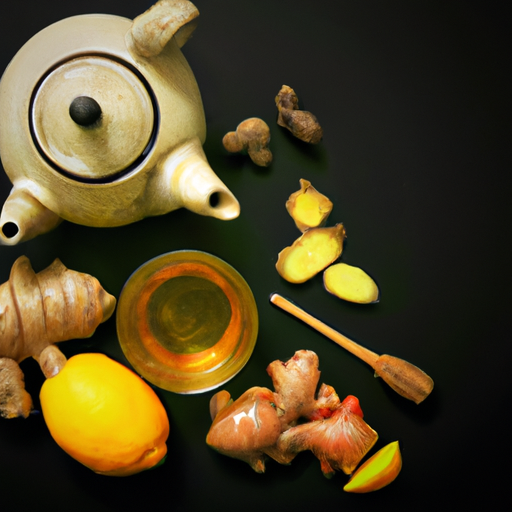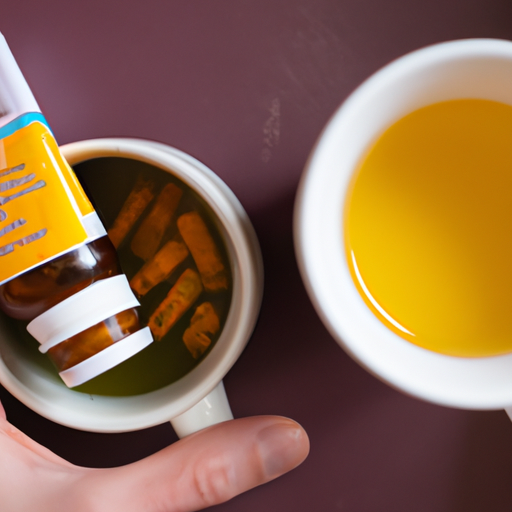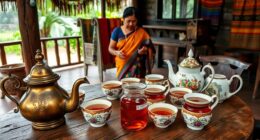As an enthusiast of natural healing methods, my go-to solution whenever I’m feeling unwell is a tea made from ginger and turmeric. These roots contain a powerful combination of antioxidants, compounds that fight inflammation, and vital nutrients known to enhance immune function, alleviate pain and inflammation, aid in digestion, and promote general well-being.
However, like any other herb or supplement, it’s important to know how much ginger and turmeric tea you should consume daily for optimal benefits without causing adverse effects.
In this article, I will share evidence-based information on the benefits of ginger and turmeric tea for health and wellness. Additionally, I’ll discuss the factors that affect dosage recommendations such as age, weight, gender, medical conditions medication use.
Furthermore,I will provide scientifically-backed guidelines on how much ginger and turmeric tea you should drink per day based on your individual needs. Whether you’re a seasoned herbalist or a beginner in the world of natural medicine,this article will give you practical tips on how to integrate these potent roots into your daily routine safely.
Key Takeaways
- The appropriate dosage of ginger and turmeric tea varies based on factors such as age, weight, gender, medical conditions, and medication use.
- Consuming 3 cups of ginger and turmeric tea per day can provide numerous health benefits, but exceeding this amount can lead to adverse effects such as gastrointestinal discomfort, heartburn, and allergic reactions.
- Ginger and turmeric have blood-thinning properties that could interact with anticoagulant medications, and high doses of turmeric may cause liver toxicity when taken over extended periods.
- Consulting with a healthcare provider before incorporating large amounts of ginger and turmeric into the diet is important, especially for individuals with certain health conditions or those taking medication.
Benefits of Ginger and Turmeric Tea
Did you know that drinking ginger and turmeric tea daily can provide a multitude of health benefits? These include reducing inflammation and improving digestion. Scientific research has shown that the active compounds in ginger and turmeric have anti-inflammatory properties that help alleviate symptoms caused by chronic inflammation.
In addition to their anti-inflammatory properties, ginger and turmeric are also rich in antioxidants. These antioxidants protect our body from free radicals that cause cell damage and contribute to the development of chronic diseases like cancer. Studies have also suggested that ginger and turmeric may help improve brain function by enhancing cognitive abilities such as memory retention.
Furthermore, these compounds aid in maintaining good gut health, which is important for overall well-being. Incorporating ginger and turmeric tea into your daily routine can do wonders for your health. However, it’s essential to ensure that you’re consuming the right amount of this tea to reap its benefits fully.
Let’s delve into the factors affecting dosage so you can make an informed decision about how much ginger and turmeric tea to drink each day.
Factors Affecting Dosage
Factors like age, weight, and health conditions can influence how often one should consume this powerful elixir. When it comes to ginger and turmeric tea, it is important to consider these factors before deciding on a dosage. For example, older adults may need a smaller dose due to reduced absorption of nutrients in the body. Additionally, people with certain health conditions or those taking medication should consult their doctor before consuming large quantities of ginger or turmeric.
One factor that affects the dosage of ginger and turmeric tea is how well your body absorbs these nutrients. Ginger and turmeric contain compounds that are not easily absorbed by the body on their own. Therefore, it may be necessary to add black pepper or coconut oil to improve absorption. Another factor affecting absorption is whether you consume the tea on an empty stomach or with food. Drinking ginger and turmeric tea with meals may enhance absorption.
It is also important to note any potential interactions between ginger and turmeric tea and medications you may be taking. Both ginger and turmeric have blood-thinning properties which could interact with anticoagulant medications such as warfarin or aspirin. People taking medication for diabetes should also monitor their blood sugar levels closely when drinking this tea as it may lower blood sugar levels.
Understanding these factors can help determine the appropriate dosage of ginger and turmeric tea for each individual’s needs. In the next section, we will discuss recommended dosages based on various factors including age, weight, and overall health status without compromising safety concerns related to excessive intake of either ingredient in isolation or combined form during consumption over time periods exceeding normal dietary use patterns without professional medical supervision.
Recommended Dosages
To ensure optimal health benefits, it’s important to follow recommended dosages of ginger and turmeric tea. While there is no one-size-fits-all dosage, the general guideline is to consume up to 3 grams of ginger and 1 gram of turmeric per day. This translates into roughly three cups of tea per day.
It’s important to note that these dosage guidelines may vary depending on an individual’s health considerations. Pregnant women should limit their intake of ginger and turmeric, as they can stimulate contractions and potentially lead to early labor or miscarriage. Those with a history of gallbladder disease or kidney stones should also be cautious, as excessive consumption can exacerbate these conditions.
Consuming 3 cups of ginger and turmeric tea per day can provide numerous health benefits, but it’s important to take into account any potential health concerns when determining the appropriate dosage for you. With proper dosing, this potent elixir can provide natural healing for your body.
Moving forward, it’s crucial to also be aware of potential side effects that may arise from overconsumption or misuse.
Potential Side Effects
Be mindful of the potential side effects that could arise from overconsumption or misuse of this powerful elixir, as these can include gastrointestinal discomfort, heartburn, and allergic reactions. While ginger and turmeric tea is generally safe for most people to consume in moderate amounts, it’s important to note that excessive intake can lead to adverse effects. It’s recommended not to exceed more than three cups a day.
Potential risks associated with long term consumption of ginger and turmeric tea are not well studied. However, some studies suggest that high doses of turmeric may cause liver toxicity when taken over extended periods. Additionally, ginger has been known to interfere with blood clotting medication and should be avoided by those taking such medications.
While there are numerous health benefits associated with drinking ginger and turmeric tea, it’s essential to be aware of its potential side effects if consumed in excess or misused. It’s always best to consult a healthcare professional before starting any new supplement regimen or increasing your daily intake beyond the recommended dosage.
Moving forward into the next section about ‘ginger tea recipes’, keep in mind that there are many ways to enjoy the flavors and health benefits of ginger without consuming excessive amounts. Here are some delicious recipes you can try out!
Ginger Tea Recipes
I love experimenting with different ginger tea recipes! One of my favorites is Fresh Ginger Root Tea. To make it, you simply boil fresh ginger root in water and let it steep for a few minutes.
Another great option is Ginger and Lemon Tea. This involves adding lemon juice and honey to freshly brewed ginger tea for a deliciously tangy flavor.
Finally, if you’re looking for something sweet, try making Ginger and Honey Tea. To do this, you simmer ginger slices in water with honey until it becomes syrupy.
These recipes are not only tasty, but they also provide numerous health benefits associated with ginger consumption.
Fresh Ginger Root Tea
Sipping on a steaming mug of fresh ginger root tea sends a warm and soothing sensation down your throat. Not only is it comforting, but it also offers several benefits for our health. Fresh ginger root has anti-inflammatory properties that can help reduce muscle pain and soreness.
It also aids digestion by speeding up the movement of food through the stomach, which may alleviate symptoms such as bloating and nausea. To brew fresh ginger root tea, start by peeling and slicing a small piece of ginger into thin pieces. Add them to a pot with water and bring to a boil.
Reduce heat and let simmer for 10-15 minutes before straining out the ginger pieces. You can add honey or lemon if desired for added flavor and health benefits. Moving on to ‘ginger and lemon tea,’ this combination offers even more health benefits due to the addition of lemon’s vitamin C content which helps support our immune system.
Ginger and Lemon Tea
As I mentioned in the previous section, fresh ginger root tea is a great way to enjoy the benefits of this versatile spice. However, if you’re looking for a little extra flavor and immune-boosting power, you might want to try making ginger and lemon tea.
To make this tasty beverage, simply slice up some fresh ginger and simmer it in water for about 10 minutes. Then add a squeeze of lemon juice and honey to taste. Not only will this combination give your taste buds a zesty kick, but it also has numerous health benefits.
Ginger has been shown to reduce inflammation, improve digestion, and boost immunity, while lemon adds vitamin C and antioxidants that can help fight off infections.
Now that we’ve covered the benefits of ginger tea with lemon added in, let’s move onto another variation: ginger and honey tea.
Ginger and Honey Tea
You can easily make a delicious cup of ginger and honey tea by simmering sliced ginger in hot water and adding a drizzle of honey for sweetness. Ginger has been used for centuries as an herbal remedy due to its anti-inflammatory and antioxidant properties. It is believed to help boost the immune system, alleviate nausea, and reduce muscle pain.
Honey, on the other hand, is known for its antibacterial and anti-inflammatory properties that can help soothe sore throats and ease coughs. Combining ginger and honey creates a powerful health-boosting elixir that can provide numerous benefits to the body.
Drinking ginger and honey tea regularly may help improve digestion, lower blood sugar levels, reduce inflammation in the body, promote healthy skin, and aid weight loss.
Now let’s explore some turmeric tea recipes that you can try at home!
Turmeric Tea Recipes
Hey, wanna spice up your tea game? Try these easy and delicious turmeric tea recipes! Turmeric tea has many health benefits, such as reducing inflammation, easing joint pain, boosting the immune system, and improving brain function. When combined with ginger, another powerful anti-inflammatory ingredient, the blend becomes even more potent.
Here are three simple turmeric tea recipes to try at home:
-
Classic Turmeric Tea: Boil 2 cups of water in a saucepan and add 1 teaspoon of ground turmeric powder. Let it simmer for about 5 minutes before straining the mixture into a cup. Add honey or lemon if desired.
-
Ginger-Turmeric Tea: Follow the same steps as above but add 1 teaspoon of grated ginger to the mixture before boiling. Strain and enjoy!
-
Golden Milk Latte: In a blender, mix together 1 cup of almond milk, 1 teaspoon each of ground turmeric and ginger powder, 1 tablespoon of honey or maple syrup, and a pinch of black pepper (which aids in turmeric absorption). Blend until smooth and frothy then heat up in a saucepan.
Incorporating these tasty drinks into your daily routine can be an easy way to boost your health while enjoying something delicious. But how much should you drink per day? Let’s explore that further in the next section on how to incorporate ginger and turmeric tea into your diet.
How to Incorporate Ginger and Turmeric Tea into Your Diet
Now that we’ve explored some delicious turmeric tea recipes, you may be wondering how to incorporate this tasty beverage into your daily routine. The good news is that there are many benefits of daily consumption of ginger and turmeric tea, making it an excellent choice for a morning or afternoon pick-me-up.
One way to incorporate the tea into your diet is to replace your morning cup of coffee with a warm mug of ginger and turmeric tea. This will not only help you wake up, but also provide numerous health benefits such as reducing inflammation, aiding digestion, and boosting immunity.
Another option is to enjoy a cup after lunch as a natural digestive aid. To make it even easier to incorporate ginger and turmeric tea into your daily routine, consider prepping the ingredients ahead of time so that all you need to do is steep the mixture in hot water when you’re ready for a cup.
You can also experiment with different flavor combinations by adding lemon juice, honey, or cinnamon. Incorporating ginger and turmeric tea into your daily routine is an easy way to reap the benefits of these powerful ingredients. But if drinking tea isn’t quite your thing, don’t worry – there are other ways to benefit from ginger and turmeric. Let’s explore some additional methods next.
Other Ways to Benefit from Ginger and Turmeric
I’ve found that incorporating supplements, topical application, and complementary therapies into my routine has also helped me benefit from ginger and turmeric.
Supplements are a great option for those who want to ensure they’re getting enough of these powerful spices, especially if they’re not able to consume them regularly through food or tea.
Topical application in the form of creams or oils can provide relief for inflammation and pain in specific areas.
Complementary therapies such as acupuncture or massage can also be helpful in conjunction with ginger and turmeric consumption for overall health benefits.
Supplements
You can easily incorporate ginger and turmeric supplements into your daily routine to reap their potential health benefits. However, be sure to do thorough research on the specific dosage and quality of supplements before consuming them regularly.
Supplement safety is important because not all supplements are created equal, and some may contain harmful additives or may interact with other medications you’re taking. When it comes to dosage recommendations, there is no one-size-fits-all answer as it depends on factors such as age, weight, and overall health status. It’s best to consult with a healthcare professional before adding any new supplement to your diet.
That being said, many experts recommend taking 500-1,000mg of turmeric extract per day for its anti-inflammatory properties while 1-2g of ginger powder per day has been shown to help reduce nausea and vomiting. With proper research and guidance from a healthcare provider, incorporating these supplements into your daily routine could potentially provide numerous health benefits.
In addition to consuming ginger and turmeric orally through supplements or food sources, topical application has also been found to have beneficial effects for skin health.
Topical Application
To soothe your skin and harness the potential benefits of ginger and turmeric, try applying a homemade paste made from fresh grated ginger or turmeric mixed with honey or coconut oil. Topical applications of these spices have been used for centuries to treat various skin conditions such as acne, psoriasis, eczema, and inflammation. The anti-inflammatory properties found in both ginger and turmeric make them excellent choices for topical use.
There are many DIY recipes available online that can guide you in making your own ginger or turmeric paste at home. A simple recipe involves mixing equal parts grated ginger or turmeric with honey or coconut oil until it forms a thick paste. Apply the mixture to affected areas and leave on for 10-15 minutes before rinsing off with warm water. Incorporating this into your skincare routine may help improve the overall appearance and health of your skin.
As we explore complementary therapies in the next section, it is important to note that while these topical remedies may provide some relief for certain skin conditions, they should not be relied upon as the sole method of treatment. It is always best to consult with a healthcare professional before beginning any new therapy or treatment plan.
Complementary Therapies
Using complementary therapies alongside traditional medical treatments can provide additional relief for certain skin conditions. Herbal remedies, such as ginger and turmeric tea, have been used in holistic medicine for centuries due to their anti-inflammatory and antioxidant properties. These two herbs contain compounds that can help reduce redness, swelling, and irritation on the skin.
Ginger and turmeric tea can be consumed daily to benefit the skin from the inside out. However, it’s important to note that these herbal remedies should not replace prescribed medications or medical treatments for any serious skin conditions. As with any complementary therapy, it’s best to consult with a healthcare professional before using them alongside other treatments.
In the next section about precautions, we will discuss other important considerations when using ginger and turmeric tea as a complementary therapy.
Precautions
When drinking ginger and turmeric tea, it’s important to keep in mind any potential precautions. While both ginger and turmeric are generally considered safe for consumption, they may interact with certain medications or exacerbate certain health conditions.
For example, individuals taking blood thinners should exercise caution when consuming large amounts of either ginger or turmeric as they can have anticoagulant effects. In addition, those who suffer from bile duct obstruction or gallstones should avoid consuming excessive amounts of turmeric as it can increase the production of bile.
Ginger may also cause gastrointestinal discomfort in some individuals if consumed in excess. It’s important to consult with a healthcare provider before incorporating large amounts of these herbs into your diet.
Overall, while ginger and turmeric offer many potential health benefits, it’s important to be mindful of any precautions when consuming them regularly. As with any complementary therapy, it’s always best to speak with a healthcare provider about how much is safe for you based on your individual health history and current medication regimen.
Frequently Asked Questions
Can ginger and turmeric tea be consumed on an empty stomach?
Starting with a figure of speech, consuming ginger and turmeric tea on an empty stomach is like fueling your body with a turbo boost.
The benefits of this combination are numerous, including reducing inflammation, aiding in digestion, boosting immunity, and promoting overall well-being.
However, it’s important to note that too much of anything can be harmful. Consuming excessive amounts of ginger and turmeric tea on an empty stomach can lead to gastric irritation and even ulcers in some cases.
Therefore, it’s crucial to consume the tea in moderation and listen to your body’s cues. As with any dietary change or supplement intake, it’s always best to consult with a healthcare professional before making any significant changes.
Is it safe to consume ginger and turmeric tea during pregnancy?
As an AI language model, I can’t give medical advice, but safety concerns should always be taken into account when pregnant or nursing. Ginger and turmeric tea have been used for their health benefits for centuries, but it’s important to use them in moderation. The recommended dosage of ginger and turmeric tea during pregnancy may vary depending on individual circumstances and medical history. It’s best to consult with a healthcare provider before consuming any herbal teas during pregnancy to ensure they’re safe for both mother and baby.
How does the combination of ginger and turmeric affect the body differently than consuming them separately?
Did you know that the combination of ginger and turmeric is often referred to as ‘ginger turmeric synergy’? It’s quite an interesting statistic that these two powerful plants, when combined, can lead to even greater health benefits than when consumed separately.
Ginger and turmeric both have anti-inflammatory properties, but the combination enhances their effects on the body. The synergy between them has been shown to reduce pain and inflammation in conditions such as arthritis and improve digestion.
Studies have also found that this potent duo may aid in reducing blood sugar levels and cholesterol. It’s clear that there are numerous health benefits of consuming ginger and turmeric together, making it a great addition to any diet.
Can ginger and turmeric tea help with weight loss?
I’ve found that Ginger and Turmeric Tea can be helpful for weight loss, but it’s not a magic solution.
The combination of ginger and turmeric in tea form has been shown to have anti-inflammatory properties which can aid in weight loss by reducing inflammation in the body.
Additionally, both ginger and turmeric have metabolism-boosting properties which can help burn calories.
However, it’s important to note that drinking Ginger and Turmeric Tea alone won’t lead to significant weight loss unless it’s combined with a healthy diet and exercise regimen.
Furthermore, beyond weight loss, there are numerous health benefits associated with consuming Ginger and Turmeric Tea such as improved digestion, reduced inflammation, lower risk of chronic diseases, among others.
What is the best time of day to consume ginger and turmeric tea for maximum benefits?
When it comes to maximizing the benefits of ginger and turmeric tea, timing is key. The optimal brewing time for this powerful beverage depends on your specific goals.
If you’re looking to boost your energy levels and improve digestion, I recommend drinking a cup in the morning.
On the other hand, if you want to promote relaxation and better sleep, enjoying a cup before bed may be more beneficial.
However, it’s important to note that while there are numerous benefits to consuming ginger and turmeric tea, there can also be drawbacks if consumed in excess or at inappropriate times. It’s always best to consult with a healthcare professional before adding any new supplements or drinks to your routine.
Conclusion
In conclusion, incorporating ginger and turmeric tea into your daily routine can offer a range of benefits such as reducing inflammation, improving digestion, and boosting immune function. However, the amount of tea you should consume per day depends on various factors like age, weight, and health condition. It’s always best to consult with a healthcare professional before starting any new supplement or herbal regimen.
Interestingly, according to a study published in the Journal of Ethnopharmacology, consuming 2 grams of ginger powder daily for 12 weeks significantly reduced levels of inflammatory markers in people with type 2 diabetes. Similarly, another study found that taking 1 gram of turmeric extract daily for eight weeks improved vascular function in women with metabolic syndrome. These findings highlight the potential therapeutic effects of these herbs when consumed consistently and in appropriate dosages.
Incorporating ginger and turmeric into your diet doesn’t have to be complicated – try adding fresh grated ginger or ground turmeric to your smoothies or soups. You can also experiment with different recipes for making ginger and turmeric tea at home. Just remember to start slow and gradually increase your dosage if needed while monitoring any potential side effects.
With proper care and attention, you can enjoy the many benefits that these powerful herbs have to offer!










